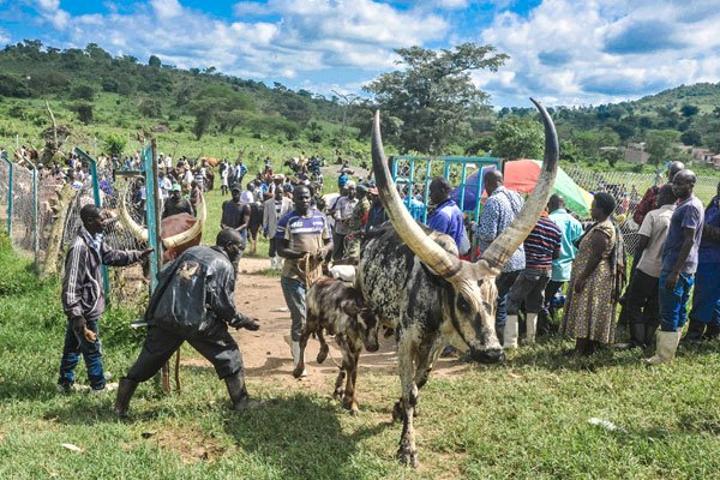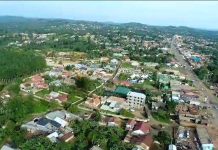Africa-Press – Uganda. The Foot-and-Mouth Disease (FMD) in greater Mbarara is under control, veterinary officials have said.
The disease has been on-and-off in the Ankole-Masaka cattle corridor, adversely affecting the cattle business.
The latest spate broke out in November last year and by February, all the five districts of greater Mbarara (Kiruhura, Isingiro, Ibanda, Kazo and Mbarara) had registered some cases.
Following the spread of the disease in Kiruhura, district authorities in January stopped all animal movements and suspended slaughters in all centres. They also closed at least 14 dairies.
Kiruhura District veterinary officer Grace Asiimwe on Wednesday said they have so far vaccinated about 100,000 cattle in the five affected sub-counties and are waiting for more vaccine from government.
“We have carried out vaccination and half [100,000] of the cattle population in the affected sub-counties of Kinoni, Kikatsi, Kenshunga, Kashongi and Kitura have been covered. We targeted areas where some cattle are already affected and in those areas where they are at risk,” Dr Asiimwe said.
He added that cases of FMD in the district have reduced except in the sub-counties of Kinoni and Kikatsi.
The ban on animal slaughter has been lifted in Nyakashashara and Sanga sub-counties but carried out under strict guidelines.
“The spread has reduced. I spend a week without a new case being reported, yet we used to have new cases every day. That’s good news. But animal movement is still at zero. Effective yesterday [Tuesday], we allowed sale of milk in areas where no new cases have been reported in the last two weeks,” Dr Asiimwe said.
He, however, said milk is now collected from villages using tankers as opposed to bicycles and motorcycles.
“Initially, we stopped selling of milk because transporters moving from farm to farm [using bicycles and motorcycles] were spreading the disease; farmers and traders cooperated and that’s how we managed to contain the disease.
“But when time for sending children back to school came, they became desperate. We have now allowed selling of milk but tankers collect from villages, we spray/disinfect these milk tankers,” Dr Asiimwe said.
Dr Hilary Arinaitwe, the Ibanda District veterinary officer, on Tuesday said the disease was last month confirmed in Kikatsi Ward in Bisheshe Division, where three farms are affected.
Mr Arinaitwe said government gave the district 20,000 doses of the vaccine. He added that veterinary doctors have done their best to contain the spread of the disease.
“We vaccinated and banned movement of livestock and products like milk, ghee and meat sold in markets and abattoirs in the area,” he said.
Traders are also not allowed to buy goats, sheep and cows from the neigbouring districts of Kazo, Kiruhura and Mbarara. Mr Arinaitwe asked farmers and local council officials to be vigilant and report people who ignore the guidelines.
Mbarara District veterinary officer Andrew Akashaba said the disease broke out in January in Biharwe Division and Kagongi Sub-county in Mbarara City.
Each had two farms affected by FMD. Besides instituting quarantine, they carried out vaccination of all the animals in the four affected farms and the surrounding ones.
They also vaccinated animals in farms along the boundary with Kiruhura District, where they suspect the disease could have originated.
Dr Akashaba also said they have carried out vaccination on farms at the highways that include Mbarara-Ibanda and Mbarara-Bushenyi.
“We have stopped movement of animals on foot in the whole district. This is because it can spread the disease on farms but also animals can pick the disease on roads, no one is allowed to move animals on foot whether going far or near,” he said.
The impact
Dr Akashaba said although they have not lost any animals, the impact has been adverse on the business community. “In areas under quarantine, farmers are not allowed to sell animals and their products, all animal slaughterhouses [butcheries] are closed, hotels restaurants not supposed to cook meat and other animal products. Any animal-related businesses are closed, including Kyenshama market. These interventions have negative economic impact on the community, most especially now that students are going back to schools,” Dr Akashaba said.
The Isingiro District veterinary officer, Dr Bruhan Kasozi, yesterday said they received 60,000 dozes of vaccination from government.
“For us now we can’t lose sleep; the disease has lessened. It is only Endinzi Sub-county that is under quarantine. We made ring vaccination and farmers and traders know what to do. Cows are sold from farms. For long livestock markets here have not been operating; it’s a preventive measure. You cannot eradicate FMD but we manage it,” Dr Kasozi said.
Some farmers have attributed the persistence and recent rapid spread of the disease to delay in carrying out mass vaccination.
Foot-and-mouthSigns and treatment.
An animal infected by Foot-and-Mouth Disease (FMD) develops sores on the tongue, lips, teats and between the hooves. The Isingiro District veterinary officer, Dr Bruhan Kasozi, said treating and caring for an infected animal is very expensive, adding that vaccination remains the best approach.
“It involves washing sores using antiseptic solution on a daily basis for at least seven days before you leave them to dry. After washing wounds you may have to apply wound spray which has antibiotic (except in the mouth). The purpose of washing wounds is to prevent secondary infections,” Dr Kasozi says. He added that sometimes the affected animals develop high temperatures and one may have to also administer temperature reducing drug (Anti Fever).
“Treating an infected cow is very expensive if you have so many sick animals on the farm, imagine all the work and cost of drugs. Vaccination is cheaper. It is the best solution. If you have vaccinated, even if there is infection, it is always mild,” he said.
Compiled by Alfred Tumushabe, Elly Karenzi, Rajab Mukombozi & Risdel Kasasira






